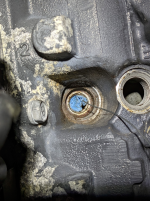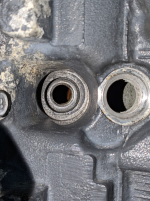wild.coast
Cadet
- Joined
- Sep 17, 2022
- Messages
- 20
While changing the spark plugs on a new to me 2014 50hp Yamaha outboard I noticed that 3 of the 4 wells have a fair bit of corrosion in them. This corrosion isn't just in the 'outer' surface of the well but extends to the machined mating surface against which the spark plug metal washer would seat.
Is this a concern?
I'm guessing the uneven corroded surface might mean that the spark plug doesn't seal/seat well causing some leakage and reducing the engine compression?
Any advice on how to clean? I don't want to go to down with a drill-mounted wire brush seeing as brush metal bristles might end up in the combustion chamber. I tried to scrape it a bit with a pick but also worried I might mar up the surface and do further damage
I'm guessing this is a common issue, any thoughts or advice?
Some pics for reference:
Two of the corroded wells:

Upper spark plug well is nice and clean (how it should look like for reference):
Is this a concern?
I'm guessing the uneven corroded surface might mean that the spark plug doesn't seal/seat well causing some leakage and reducing the engine compression?
Any advice on how to clean? I don't want to go to down with a drill-mounted wire brush seeing as brush metal bristles might end up in the combustion chamber. I tried to scrape it a bit with a pick but also worried I might mar up the surface and do further damage
I'm guessing this is a common issue, any thoughts or advice?
Some pics for reference:
Two of the corroded wells:


Upper spark plug well is nice and clean (how it should look like for reference):























